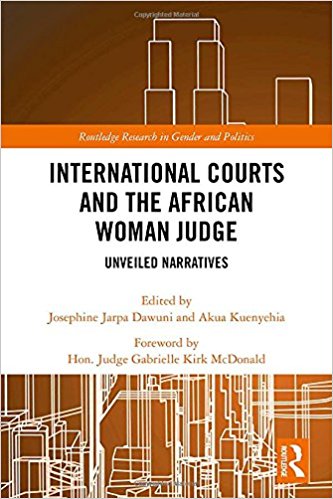“International Courts and the African Woman Judge: Unveiled Narratives” by GQUALizer Dr. Josephine Jarpa Dawuni out now!
What is the impact of having a more gender-balanced tribunal? Does this really affect the outcome of a decision? The question of whether or not women judges make a difference in court rulings has been long debated. While evidence from research is inconclusive, some of these answers arise when we talk about gender representation on an international level.
In this context, Josephine Dawuni makes a very powerful statement in her new book, International Courts and the African Woman Judge: Unveiled Narratives (Routledge, 2018). She argues that, as long as women meet statutory qualifications and are duly elected, they have as much right to sit on benches and participate on the settlement of States’ disputes as any other man, without having to validate or justify their presence with “value addition.”
As the Executive Director of the Institute for African Women in Law (IAWL), Dawuni ‘s work recognizes that the application of instruments such as the Maputo Protocol, Convention on the Elimination of All Forms of Discrimination against Women (CEDAW), and the Rome Statue makes it possible to increase the pool of women in domestic judiciaries.
Additionally, in order to illustrate the growing power of women’s rise to the top, Dawuni’s book recounts stories and narratives of African female judges overcoming adversity and reaching work in International Courts. Even though the narratives in this book are specific accounts of individuals, this is the first time that a book addresses the professional and personal journeys that female judges from Africa must overcome to work on international tribunals.
Dawuni notes there are multiple factors that explain the history and growing trend of African female judges in International courts; most notably that governments at the domestic level are more frequently fulfilling their legal and political duties of treaties and protocols on gender equality in decision-making.
Here at GQUAL we believe this is a compelling reason to continue building a strong coalition of researchers, policy-makers, governments and other organizations to develop mechanisms that guarantee diversity in all its forms and manifestations within international bodies. For Josephine Dawuni, the verdict is clear: in a world where half of the population is female, equal representation should be considered the human thing to do.
You can read the full interview here.

